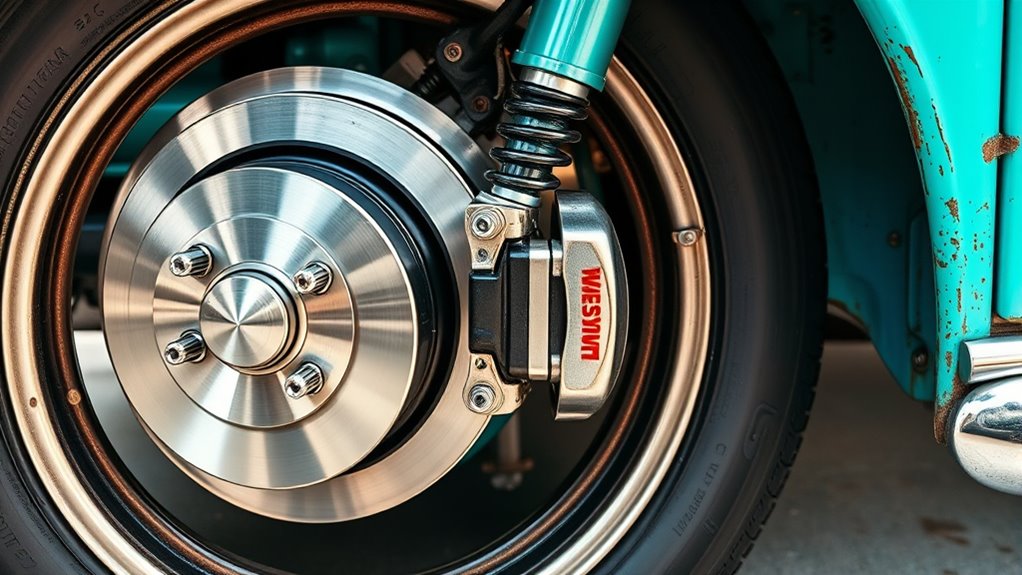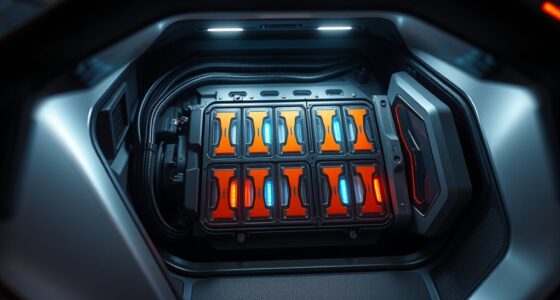Upgrading your VW Bus’s brakes with larger rotors, high-performance pads, and stainless steel lines improves stopping power, reduces fade, and boosts safety. Enhancing suspension geometry through precise alignment and camber adjustments increases handling, stability, and tire longevity. Combining these upgrades results in a more confident, responsive drive, especially on steep or uneven surfaces. To make sure everything works smoothly and stays compliant, professional installation and regular maintenance are essential—discover how to get the most from these upgrades next.
Key Takeaways
- Upgrading VW Bus brakes with larger rotors and performance pads enhances stopping power and heat dissipation for safer, consistent braking.
- Modern suspension components and geometry adjustments improve handling, stability, and tire wear, boosting overall safety.
- Combining brake and suspension upgrades offers more predictable, responsive control during spirited driving or emergency stops.
- Professional installation and precise alignment are critical for optimal safety, performance, and component longevity.
- Regular maintenance and awareness of regional regulations ensure ongoing safety and legal compliance of upgraded braking and suspension systems.

Upgrading your braking and suspension systems is vital for improving your vehicle’s handling, safety, and overall performance. When you focus on the braking system components, you’re guaranteeing that your VW Bus can stop reliably under various conditions. Modern brake upgrades often include larger rotors, high-performance pads, and stainless steel lines, which reduce fade and improve pedal feel. These enhancements mean you’ll have more consistent braking power, especially during long drives or steep descents. Properly upgraded brakes also help prevent overheating, which can compromise safety and damage your vehicle’s components over time.
Upgrading brakes enhances safety, consistency, and performance for your VW Bus in all driving conditions.
In addition to the braking system components, paying attention to your suspension geometry plays a pivotal role in your vehicle’s handling. Suspension geometry refers to the angles and positioning of suspension parts, which directly influence steering response, stability, and tire wear. When you upgrade your suspension, you can adjust these parameters to better suit your driving style or specific needs. For example, modifying camber angles can improve cornering grip, while adjusting caster can enhance straight-line stability. Maintaining proper suspension geometry is essential because even the best brakes won’t perform at their best if your suspension isn’t aligned correctly, leading to uneven tire wear and compromised handling.
When you combine upgraded brake components with a well-tuned suspension geometry, your VW Bus becomes more predictable and responsive. You’ll notice sharper turn-in, improved grip, and a more confident feel during spirited driving or everyday commuting. It’s not just about adding power; it’s about making sure that power translates safely and effectively to the road. Upgrading these systems also means your vehicle can better handle uneven surfaces or sudden stops, which is especially important if you frequently carry heavy loads or travel on rough roads.
To maximize these benefits, you should consider professional installation and alignment. Properly installed brake components ensure safety and longevity, while precise adjustments to suspension geometry restore factory settings or optimize them for your specific driving conditions. Regular maintenance and inspections are critical to keep everything functioning smoothly, especially as your vehicle ages or if you modify its components. Additionally, understanding the importance of regional legal resources can help you navigate regulations or find specialized assistance when upgrading your vehicle. By focusing on these upgrades and maintenance practices, you’ll greatly boost your VW Bus’s safety, handling, and overall driving experience, giving you peace of mind on every journey.
Frequently Asked Questions
How Do Braking Upgrades Affect Fuel Efficiency?
Upgrading your braking system can impact fuel efficiency, but the effects are usually minimal. Improved braking system efficiency ensures better stopping power without overexerting your engine, helping maintain ideal fuel use. Enhanced suspension durability reduces rolling resistance and maintains proper tire contact, which can slightly improve fuel economy. While these upgrades mainly focus on safety, they can also contribute to more efficient fuel consumption if chosen wisely and installed correctly.
Are Suspension Upgrades Suitable for Off-Road VW Bus Use?
Are suspension upgrades suitable for off-road VW bus use? Absolutely, if you seek off-road durability and suspension compatibility. You’ll improve handling on rugged terrains, enhance stability, and protect your vehicle from rough impacts. Upgrading suspension components like shocks, struts, and lifts guarantees your bus can handle uneven surfaces, rough trails, and challenging conditions. With the right upgrades, you’ll enjoy a safer, more confident off-road adventure every time you hit the dirt.
What Are the Cost Implications of Different Brake and Suspension Kits?
When considering different brake and suspension kits, you’ll find varying costs based on quality and features. Upgrading your braking system with larger rotors or high-performance calipers costs more but improves safety and stopping power. Suspension components like heavy-duty shocks or lifted springs also vary in price, with off-road gear being pricier. Budgeting for installation and potential modifications is essential, but investing in quality parts guarantees durability and better performance.
Can Stock VW Bus Parts Be Integrated With Modern Upgrades?
You can often integrate stock VW Bus parts with modern upgrades to balance restoration originality and aesthetic modifications. For example, upgrading brakes with modern components while keeping original-looking drums preserves the vintage look. Using stock parts for suspension upgrades can maintain authenticity, but guarantee compatibility with newer parts for safety and performance. This approach lets you enhance safety and functionality without sacrificing the classic appeal of your VW Bus.
How Do Upgrades Impact Vehicle Warranty and Insurance?
When you upgrade your VW bus’s braking or suspension, you should be aware it can impact your vehicle warranty and insurance. Many upgrades might void your warranty if they’re not approved by the manufacturer, and insurance companies could see these modifications as increasing risk, leading to higher premiums or coverage issues. Always check with your warranty provider and insurer before making upgrades to avoid warranty voiding and ensure proper coverage.
Conclusion
Upgrading your brakes and suspension transforms your VW Bus into a safer, more responsive vehicle. It enhances stopping power, improves handling, and increases confidence on every journey. It’s about more than just comfort; it’s about control, safety, and peace of mind. By investing in these upgrades, you’re not just improving performance — you’re safeguarding yourself, your passengers, and everyone around you. Because when you prioritize safety, you ensure every ride is secure, smooth, and ready for whatever lies ahead.









